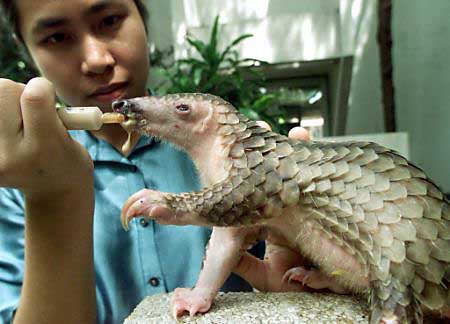Just the facts #3
Today's questions:
What is the line between artificial and natural?
and, in relation to tomato sauce:
At what point does a tomato cease to be a fruit?
In response to the first question, i would contend that "artificial" means that it has been constructed or manufactured by human beings, while natural means it may be found already existing in nature without human interference. What this means in actual fact is really a question of context. For example, a food product may claim it contains "no artificial colours or flavours", but obviously, it may be coloured or flavoured with "natural" agents. The same goes for artificial sweeteners, preservatives, and so on.
In this context, it usually means the difference between a naturally occurring chemical, which is extracted directly from a plant or animal, and a synthetic chemical, which is obtained by chemical reaction in a laboratory or factory. There is no guarantee that a naturally occurring chemical is any safer than a synthetic one, and some of the most toxic substances known to science come directly from natural sources. In fact, in certain cases, synthetic versions of chemicals may be safer than their "natural" alternatives, having potentially toxic, carcinogenic or mutagenic compounds removed or converted into harmless forms.
As for the second question, this requires a brief foray into botanical terminology. In botanical terms, a fruit is the seed of a plant, together with the ripened ovary. So, a grain of wheat is a fruit, as is a coconut, and at least part of what we call a Tomato. The tomato is formed when the ovules in a tomato flower are fertilised by pollen. The ovules are contained within an ovary, which swells after fertilisation to become the flesh of the tomato fruit. However, tomato sauce is usually made with only the fleshy parts of a tomato, known as the carpel, excluding the seeds. So in my opinion, a tomato ceases to be a fruit when it is de-seeded, as the seed is the defining characteristic of a fruit.
However, while this is a botanical explanation of when a tomato ceases to be a fruit, legally, in the United States at least, it ceased to be a fruit in 1893, as a result of a court ruling on tariffs covering fruit and vegetables. According to the US supreme court, the tomato is a vegetable.
What is the line between artificial and natural?
and, in relation to tomato sauce:
At what point does a tomato cease to be a fruit?
In response to the first question, i would contend that "artificial" means that it has been constructed or manufactured by human beings, while natural means it may be found already existing in nature without human interference. What this means in actual fact is really a question of context. For example, a food product may claim it contains "no artificial colours or flavours", but obviously, it may be coloured or flavoured with "natural" agents. The same goes for artificial sweeteners, preservatives, and so on.
In this context, it usually means the difference between a naturally occurring chemical, which is extracted directly from a plant or animal, and a synthetic chemical, which is obtained by chemical reaction in a laboratory or factory. There is no guarantee that a naturally occurring chemical is any safer than a synthetic one, and some of the most toxic substances known to science come directly from natural sources. In fact, in certain cases, synthetic versions of chemicals may be safer than their "natural" alternatives, having potentially toxic, carcinogenic or mutagenic compounds removed or converted into harmless forms.
As for the second question, this requires a brief foray into botanical terminology. In botanical terms, a fruit is the seed of a plant, together with the ripened ovary. So, a grain of wheat is a fruit, as is a coconut, and at least part of what we call a Tomato. The tomato is formed when the ovules in a tomato flower are fertilised by pollen. The ovules are contained within an ovary, which swells after fertilisation to become the flesh of the tomato fruit. However, tomato sauce is usually made with only the fleshy parts of a tomato, known as the carpel, excluding the seeds. So in my opinion, a tomato ceases to be a fruit when it is de-seeded, as the seed is the defining characteristic of a fruit.
However, while this is a botanical explanation of when a tomato ceases to be a fruit, legally, in the United States at least, it ceased to be a fruit in 1893, as a result of a court ruling on tariffs covering fruit and vegetables. According to the US supreme court, the tomato is a vegetable.


0 Comments:
Post a Comment
<< Home